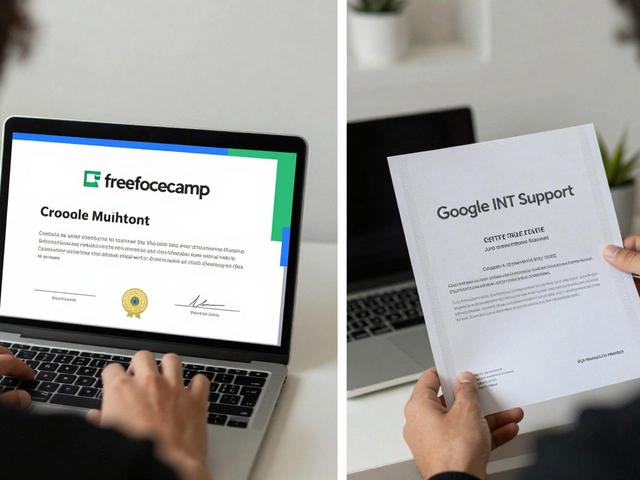Stuck in a job you can’t stand, but dreading years of study before switching? You’re not alone. In fact, a recent SEEK survey found that nearly half of Australians have considered retraining for a new job within the past year. But most people think making a career change is automatically a long, expensive slog. The truth? There are legit careers—real jobs, not side hustles or get-rich-quick schemes—that you can launch surprisingly fast. Some require only weeks or months of training. Some pay decent money right out of the gate. Let’s look at the fastest ways to shake up your 9-to-5 without a multi-year university detour.
Why Quick Careers Matter Now More Than Ever
There’s never been a more confusing time to pick a path. Back in the day, jobs like IT, medicine, or law were seen as rock-solid—but now even those can feel risky, demanding huge investments in time and money before you see a single paycheck. COVID-19 shook up every job market, and suddenly people started asking, "Why wait three or four years before earning good money? Can I skip the uni debt and still get ahead?" Maybe you’ve experienced layoffs or career burnout, or you just want more flexibility. Whatever the reason, the appeal of quick careers is growing.
One important factor is cost: in Australia, the average annual university fee ranges from $6,500 to $45,000 per year depending on your field. And that’s before you factor in living expenses. Compare that with a short course in fields like IT support, real estate, or personal training, which can be completed in a few months for a fraction of the price. Some programs offer job placements, making the leap even smoother.
Another reason? Demand. Roles that can be filled fast are often the ones in high demand, meaning employers want you yesterday. Think of aged care workers, truck drivers, trade assistants, baristas, security guards, or IT support crew. Hospitality often hires fast, and clients expect you to learn on the job. Entry-level jobs that focus on your willingness to work instead of your academic pedigree can change your life in weeks, not years.
The mental health angle matters, too. Starting a new career quickly might stop that stuck-in-a-rut feeling before it spirals. You see progress, new faces, and the promise of something better. And quick doesn’t mean "easy" or "low status." Many speedy certs lead to real careers, especially if you’re open to learning and advancement once you’re hired.
Top Fastest Careers You Can Start Right Now
Okay, so which jobs are actually possible to start fast—without a degree, long apprenticeship, or years of red tape? Here’s a look at options that get you hired quickly, based on Australian training providers, job ads, and government data. Pay rates and job prospects are pulled from the latest 2025 SEEK and JobOutlook data sources, so these are the real deals.
- Certificate III in Individual Support (Aged Care or Disability): This certificate can take as little as 12 weeks full-time (many courses offer condensed terms). Demand for carers continues to skyrocket—there are over 300,000 people currently employed in the sector in Australia, and the government projects tens of thousands more will be needed by 2030. Starting pay ranges from $25–30 an hour, with full-time, part-time, and contract options.
- Security Guard: You need to complete a Certificate II or III in Security Operations, usually a course lasting just 2–6 weeks. Once you have your security license, you can start working at events, shopping centres, or construction sites. Casual pay can reach $30–35 an hour on weekends and nights.
- Barista or Hospitality Worker: Sydney’s coffee scene is famous (and competitive). But you don’t need a fancy diploma. A barista course is just a single day, and Responsible Service of Alcohol (RSA) certificates can be completed online in under a week. Cafes hire quickly—often within days if you can make a good flat white.
- Truck Driver: With a Heavy Rigid (HR) or Medium Rigid (MR) license from a recognized driving school, you can be job-ready in 2–4 weeks. The shortage of drivers remains severe, pushing starting salaries to $60,000–80,000 per year, and experienced ones can make six figures.
- Real Estate Agent: Yes, there’s some study involved—a Certificate IV in Real Estate Practice, which you can finish in a few months part-time. Entry pay isn’t always high because roles are often commission-based, but the potential for fast progress is massive if you’re a people person.
- IT Support (Helpdesk): Believe it or not, you don’t need a 3-year degree to land an entry-level IT support role. Short courses in CompTIA A+, Google IT Support, or Microsoft certificates can be done entirely online in a few weeks to a couple of months. Starting pay averages $55,000–65,000 in Sydney and rises fast with extra certs.
- Personal Trainer or Group Fitness Instructor: Certificate III (or IV) in Fitness takes 3–6 months, but some intensive options knock it out in less than two. Many gyms hire freshly certified trainees, and freelance PTs can build their business from day one.
- Retail Sales: No formal qualification needed. New hires learn on the job in a matter of days and national chains like Coles, Woolworths, JB Hi-Fi regularly advertise for people who can start ASAP.
- Childcare Assistant: Certificate III in Early Childhood Education and Care can be done in 12–16 weeks. There’s ongoing demand, especially for afterschool and holiday programs, with plenty of part-time and flexible shifts.
- Trade Assistant (TA): No license or diploma required. You start at entry-level, working with electricians or construction teams, earning $25–35 an hour in Sydney. Some TAs transition into apprenticeships, but that's optional.
For visual-loving readers, here’s a snapshot of just how short some of these training programs are, compared to the years needed for a university degree:
| Career | Required Training | Average Training Time | Starting Pay (AUD) |
|---|---|---|---|
| Aged Care Worker | Cert III | 3 months | $25+/hour |
| Security Guard | Cert II or III | 2–6 weeks | $30+/hour |
| Barista | Short Course + RSA | 1 day–1 week | $22–28/hour |
| IT Support | Short Cert | 2–8 weeks | $55–65K/year |
| Truck Driver | License | 2–4 weeks | $60–80K/year |
| Retail Assistant | None | On the job | $23–27/hour |
If you’re after the absolute fastest option, security guard and barista qualifications can have you earning a paycheck within a week.

How to Choose the Fastest Career for You
Speed is great, but it’s not the only thing that matters. You want something you’ll actually enjoy, or at least can stick with until you find your niche. Here’s a reality check: not all fast-track careers suit every personality.
Picture yourself at a crowded music festival, keeping crowds safe as a freshly licensed security guard. Are you comfortable speaking up if there’s trouble? Or say you’re pouring lattes at 6 AM—are you a morning person who thrives on fast-paced conversations? Truck drivers spend days on the road solo (with podcasts for company), while aged care and childcare workers build deep, rewarding relationships but sometimes face tough days.
If you’re unsure, try this exercise: look up three job ads for a "quick career" in your area. Notice the required skills. Then ask yourself, could you handle those tasks with a week or two of focused learning? If not, it’s okay to slow down and consider a cert or course that adds a few months but gets you closer to your ideal job. The fastest career isn’t always the best fit—but the right quick launchpad can open up more choices down the road.
Salary isn’t everything, but it’s still a big motivator. Quick jobs aren’t all minimum wage—some pay above average, especially for night shifts or weekends. But understand what’s realistic: you might not start on top pay, but you’ll earn while you learn, and many employers cover extra training after you’re hired. Bonus tip: government and "essential service" jobs almost always offer stable hours, paid leave, and a clear path to upskill if you want more responsibility later.
Networking still matters, even with fast-track jobs. Some of the hottest barista and hospitality gigs, for instance, come from word-of-mouth, not job boards. Visit your local café, ask friends, join Facebook job groups, or talk to trainers. Nailing a trial shift can land you a job way faster than a polished resume alone.
Tips to Get Hired in the Fastest Careers
Okay, let’s talk tactics. You’ve picked a career, smashed out the training, and now you want to start work—like, yesterday. Here’s what actually gets people hired quickly:
- Be early and persistent: Don’t wait for a fancy online ad. Some fast-track roles are filled the same day someone quits. Drop a one-page resume—mention your new qualification—at places you’d like to work and ask to speak with the manager.
- Document your training. Have proof of your cert or license handy—this matters in jobs like security, childcare, and fitness coaching where it’s illegal to work without it.
- Take every trial shift or casual gig you’re offered, even if the pay isn’t top dollar. Short "test" shifts help employers see your attitude, and some roles even hire people on the spot.
- Make it clear you can work flexible hours. Fast-track jobs often need "all hands on deck" for evenings, weekends, or early mornings. If you’re willing to fill an unpopular shift, you’re far more valuable.
- Check for free or government-backed training courses. Some states run incentives to get people job-ready, especially in health or community care—sometimes saving you hundreds (or thousands) of dollars.
- Use local Facebook or WhatsApp job groups. Many businesses in Sydney and beyond now post openings there first, hoping for a faster reply than they get from job boards.
- Stay sharp, keep learning. The quickest career often turns into a better full-time path if you keep stacking new skills while you work. Look for extra modules, micro-credentials, or short workshops—especially if your employer covers the cost.
- Ask new colleagues or trainers about typical interview questions. For example, in aged care, you’ll often get asked about handling challenging client behaviour, while in hospitality, it’s all about speed and customer service.
- Don’t stress about not having "experience." Show energy, a willingness to learn, and a real interest in the job—most managers care more about fit and attitude than what’s on paper in quick-hire roles.
- Get your paperwork sorted early. This includes working with children checks (for childcare or teaching assistant work), police checks (for security or care jobs), or first aid certs. Being one step ahead helps you start fast.
If you want a job in hand by next month, it's as simple as picking a path, doing the cert, showing up with energy, and letting friends know you’re ready to start now.







0 Comments